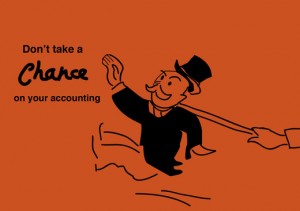Accounting Mistakes Entrepreneurs Make

Confusing cash flow and profits
Even though your business may be bringing in a respectable amount of income, if you’re not scrupulously keeping track of spending, you probably have a pretty poor idea of what your profits actually are. For instance, when sales are up, the initial response may be to ramp up production by making large purchases of supplies or equipment without understanding how those purchases are affecting your bottom line – and your business’ ability to continue to operate. That does not mean you shouldn’t expand, but any expansion that is undertaken should be made based on a careful analysis of your business’ profit and cash reserves as well as its ability to handle additional debt.
Counting sales revenue before the sale is completed
It may be tempting to count sales as soon as they are made rather than when delivery is actually made, but that is a practice that can yield incorrect data resulting in a faulty financial picture of your business. Worst case scenario: you will end up having to revise your company’s financials and develop a new course of action once the actual data is crunched. This problem occurs commonly in companies that sell a product or service that is not actually delivered until a future date – for instance, sales of items still in development or production.
Making a big purchase without considering its financial impact
Upgrading equipment may be necessary, but you need to be aware of the impact a large purchase can have on your cash reserves as well as the effect it can have on your taxes – especially if you depreciate the item. The best course of action: Make sure you understand all the financial ramifications of your purchase and consider non-cash alternatives like low-interest credit cards or leasing.
Getting distracted & missing deadlines
If you choose to do your own bookkeeping, you risk delays and distractions. Day-to-day operations are hectic and demanding. As a business owner, it is easy for you to prioritize growing your business and pleasing your customers over and above taking the time to review, update, and report on your finances. If you delay bookkeeping, you may miss important taxation deadlines that will result in penalties. You may also negate payments, resulting in poor stakeholder and vendor relations. Most distressingly, you may miss important financial indicators that act as warnings when your company is headed for trouble.
Don’t be an entrepreneur who makes these accounting mistakes. Contact Hogg, Shain & Scheck for advice from seasoned professionals who prioritize your best interests and the success of your enterprise.






